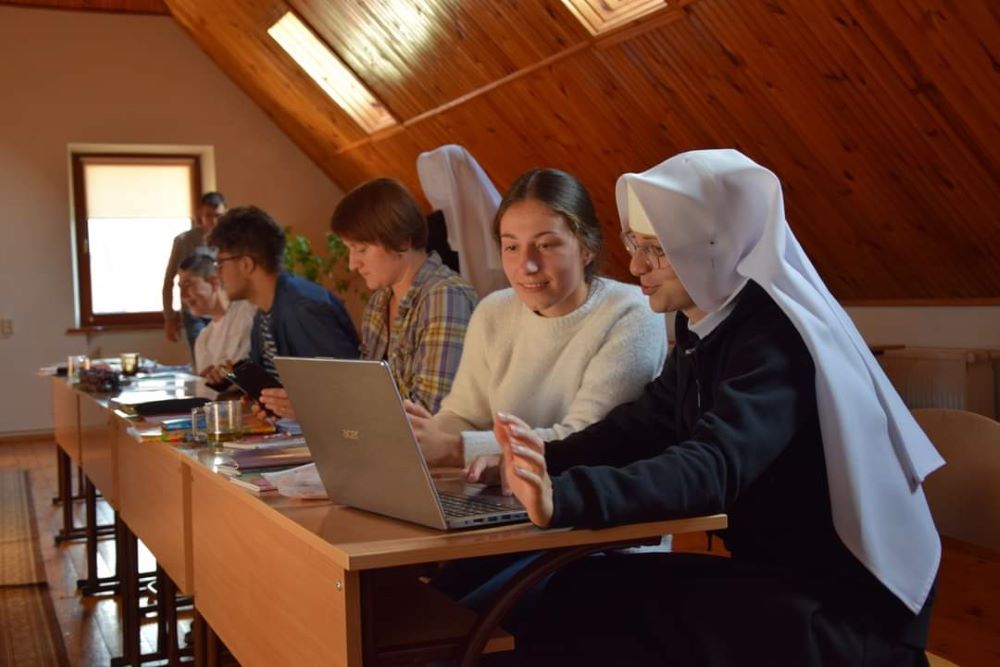Benedictine sisters relax during a meeting in the Ukrainian Carpathian Mountains. (Courtesy of Scholastica Oleksandra Hulivata)
Monasticism raises many questions for people. As a nun, I often encounter surprised looks from passersby or even exclamations of surprise: sometimes gratitude, sometimes condemnation. This last was the most difficult for me to understand; I could not find a logical explanation for what kind of damage I can cause with my appearance or my lifestyle to ordinary passersby.
Later, I concluded that the explanation lies more in the attitude of that particular person than in myself. Such a reaction can be caused by some life difficulties and disappointments. In that case, the appearance of a spiritual person may provokes questions: If someone seriously dedicates one's life to God, then maybe God exists? Or: How can you do something just for the good of others, without pursuing your own benefit … something must be wrong here?
There is the misconception that monastic life is only a limitation. In conversation with people of various ages, I am often asked: You can't do this and that, and that... how can you live with such restrictions? "However," I answer, "we can do many other things" — and give very specific examples. But my questioners are not usually ready for such a confrontation, because they prefer to continue living with convenient stereotypes, with simple answers to complex questions.
Among all the numerous possibilities to explain my life, I will try to summarize, choosing explanations that are the most essential and valuable for me personally. I like to think of the possibilities that consecrated life opens up to us in the triple dimension of relationships: relationships with God, relationships with oneself and relationships with other people.

Sr. Scholastica Oleksandra Hulivata studies at the Theological institute of Our Lady of Immaculate Conception. She defended her master's thesis in dogmatic theology in June. (Courtesy of Scholastica Oleksandra Hulivata)
First, when you dedicate your life to God, you receive the gift of indescribable freedom, freedom in Christ, because "Christ set us free that we might be free" (Galatians 5:1). Life in God's presence must be a free choice because where there is coercion or fear, there can be no question of love. Love can only be answered with love: Christ, out of love for humanity, gives everything he has and everything he is.
In the same way, consecrated people are invited to participate in the sacrificial love of Christ. True love is the gift of everything you have that is most valuable: your time, presence, efforts and skills. On the one hand, God gives us true freedom, revealing his unconditional love and selfless gift of salvation. On the other hand, freedom opens in the direction of people who do not pose a threat. On the contrary, they help us discover the truth about ourselves, helping us find the right direction to realize our freedom, which is service.
The experience of monastic life made me free, first of all, from myself — from my views, desires and plans. Though they have not disappeared and continue to exist in my head, they are no longer the main criterion in my decision-making. There is a much better, more perfect way: God's plan for my life. I just need to become free to accept it. Since I cannot always influence the situation and circumstances in which I live and work, the words of an experienced nun have become a life rule for me: "Be useful where you are and do as much as you can in a specific situation, and God will take care of everything else."
Second, life in a monastic community opens the way for deep self-knowledge, creating a space for further development in spiritual, intellectual, ascetic, mystical and other dimensions of life. Becoming a monk or a nun, we seek the truth about ourselves as a person — God's image and God's likeness.
Sr. Scholastica Oleksandra Hulivata with youth at a Christian festival (Courtesy of Scholastica Oleksandra Hulivata)
In his charter, St. Benedict calls the monastery "a school of service to the Lord." Therefore, each of us is only a student on our life path, and it is natural that we encounter certain difficulties. At the same time, we have unlimited potential and the opportunity to grow. The main task of a monk, according to St. Benedict, is conversion — changing one's thinking, views and habits.
Everything that does not correspond to the teachings of the Gospel and the example of the Teacher must be unearthed and accepted, in order to begin the painful process that leads to transformation and assimilation into Christ. It so happened that it was consecrated life that created the appropriate conditions and gave me the motivation for attentive and patient knowledge of myself, for the search for deeper meaning as well as for the study of theology.
I had completely different interests and never considered theology as a subject of scientific interest, but at the decision of my superiors, I began studying at the Institute of Theological Sciences of the Immaculate Conception of the Blessed Virgin Mary. In June I defended my master's thesis in dogmatic theology, for which I am infinitely grateful to God and everyone who helped me on this difficult, but a fascinating path.
Third, no one comes to God alone. As Evagrius of Pontius says in his writing on Prayer (de Oratione 124): "A monk is one who is both separated from all and joined to all." Living by evangelical counsels opens a wealth of relationships with other people. First, we meet others as brothers and sisters from our communities, then learn to accept their views, worldview and way of life — and we are incredibly enriched by being in this community of the called. If we look at the community of Christ's disciples with faith, we will see that each of them is a gift. Sometimes it's difficult, but still a gift.
Advertisement
One of the important chapters of my life became serving children in a family-type orphanage, where I still work. With 10 children — for various reasons left without the care of their biological parents — two sisters and I spend most of our time together learning to build a family. Service in this community became for me the fulfillment of Christ's promise: "There is no one who, having left his home or brothers or sisters or mother or father or children or fields — for my sake and the sake of the Gospel — would not receive a hundredfold now, at this time, amid persecution, of homes, brothers, sisters, mothers, children, and fields, and in the age to come, eternal life" (Mark 10: 29-30).
Our consecration acquired another dimension in the war that engulfed Ukraine Feb. 24. In this difficult and exhausting war, we unite with every Ukrainian, wherever they are: in captivity, trenches, hospitals, warehouses, factories or refugee centers. Feeling the support of others is important, but life reminds us how important it is to become a support for those who have lost everything.
Today, more than ever, Ukraine and the world need witnesses of love, mercy, brotherhood, peace and self-denial. We — consecrated men and women whom God has gifted with all the means necessary for this —can become such witnesses. "You are the light of the world" (Matthew 5:14-15).







